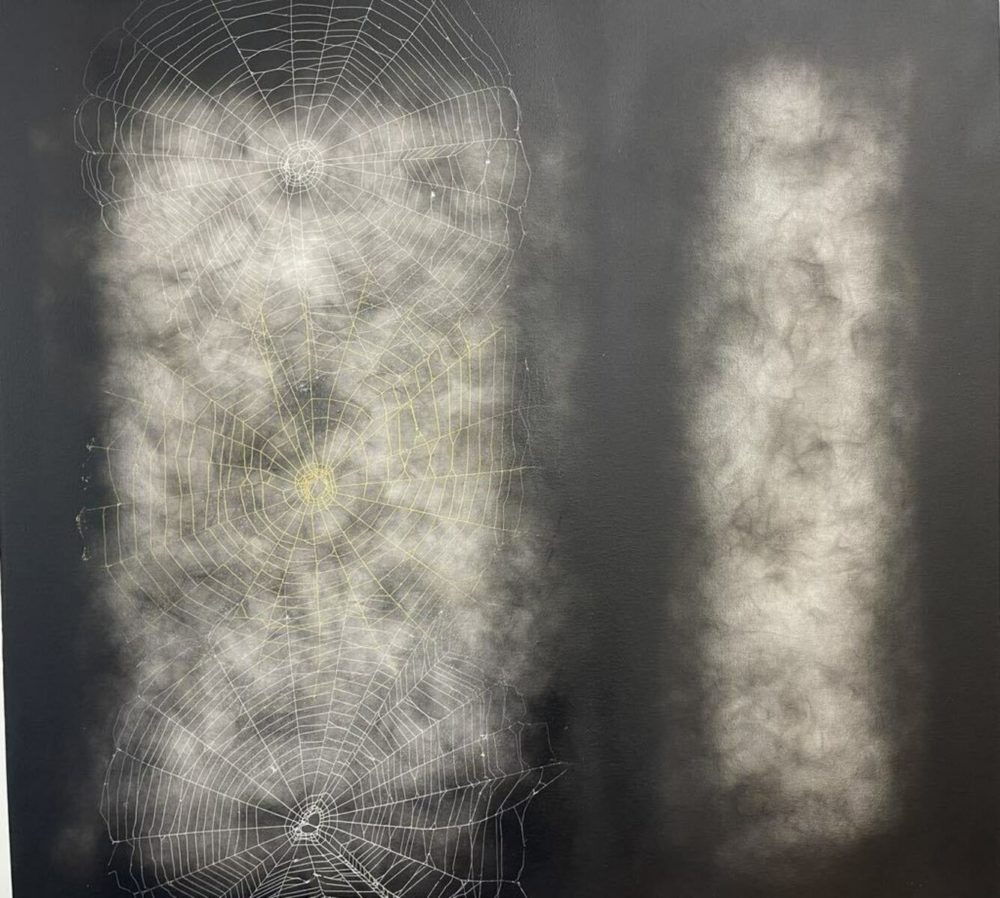
Heavily inspired by his Tongan heritage, Maka creates large-scale abstract works that incorporate traditional Tongan art forms while combining contemporary and experimental methods and techniques. Maka works in large-scale, creating Ngatu ‘uli (black tapa cloth) by collecting candlenut seed residue and combining it with oil to make black paint, applying to the tapa cloth that hang from the gallery walls to extend across the floor. These are immersive works that for Maka explore the relationships and interconnectivity between Tonga and Britain in both a historical and contemporary context.
Continuing his work within this methodology, Maka creates ‘smoke paintings’ using paraffin lamp smoke applied to the surface as he lays underneath a canvas suspended above him. Maka then harvests real spider webs, painting them with vibrant primary colours before offering them to the smoked canvas. Exploring the relationship between form and meaning, these striking abstract works are frequently created with just one or two punches of coloured spider webs, layered on top of a canvas blackened with smoke. Maka’s distinctive technique bring texture and liveliness to form, the depth of smoke that shifts in intensity between a consuming depth and richness to areas of gentle whisps that meet to form an intricate network of tone and form – the light emerging from within. Maka Sources his webs from his studio-based ‘spider farm’ where one resident, ‘John’ lives in a shell and will emerge when Maka approaches with an offering of food. Gently harvesting the webs, Maka uses spray paint to colour and layer the fine threads.
Maka, born in Tonga’s village of Pātangata, is the second youngest among 12 siblings. His father worked as a carpenter, while his mother engaged in fishing and Tapa making. Despite limited financial means, Maka harboured aspirations of becoming a professional artist, instilled in him by his teacher, Professor Viliami Toluta’u, and Ve’etūtū Pahulu, a Composer, Tongan Poet, and choreographer. His formative years in Tonga were spent near the ocean, engrossed in drawing and sketching. Following his education at Liahona High School in Tonga, Maka and his family relocated to Auckland, New Zealand, before finally settling in Christchurch, where he established his studio.
Between 1990 and 1996, Maka showcased murals in Tonga, Ha’apai, before relocating to New Zealand. In 2001, he attained a certificate in Art and Design from Whitecliffe College of Arts and Design in Auckland. Continuing his academic pursuit from 2002 to 2004, he earned a BA in Visual Art from Manukau Institute of Technology, Auckland, with a specialisation in painting. During his studies, Maka revisited Tonga to delve deeper into the traditional practice of Ngatu Tā ‘Uli (Blackened Tapa Cloth), a pivotal aspect of his artistic exploration.
“My paintings capture a sense of being in an interconnected world. They encapsulate a moment in history to preserve it for the future. Their intention is to connect us with the past, to learn from and to look forward in gratitude.”

In 2008, Maka was honoured with the Margaret Stoddart award at the Festival of Flowers. This recognition catalysed his career, leading to his selection as the Pacific artist in Residence at the University of Canterbury the following year, where he received studio space, financial support, and resources. Notable alumni of this residency include Tusiata Avia, David Fane, John Pule, and Michel Tuffery.
In 2014, Maka participated in the Tonga ‘i Onopooni exhibition at Pataka Art and Museum in Lower Hutt, marking the inaugural showcase of contemporary Tongan artists residing in New Zealand. His artwork from this exhibition, Ngatu ta’uli (blackened tapa cloth) (2010), has since become a part of the permanent collection at Te Papa, the national museum of New Zealand.
From 2020, Maka’s artistic endeavours merged contemporary techniques with Tongan heritage, utilizing spiderwebs to craft intricate patterns on Ngatu.